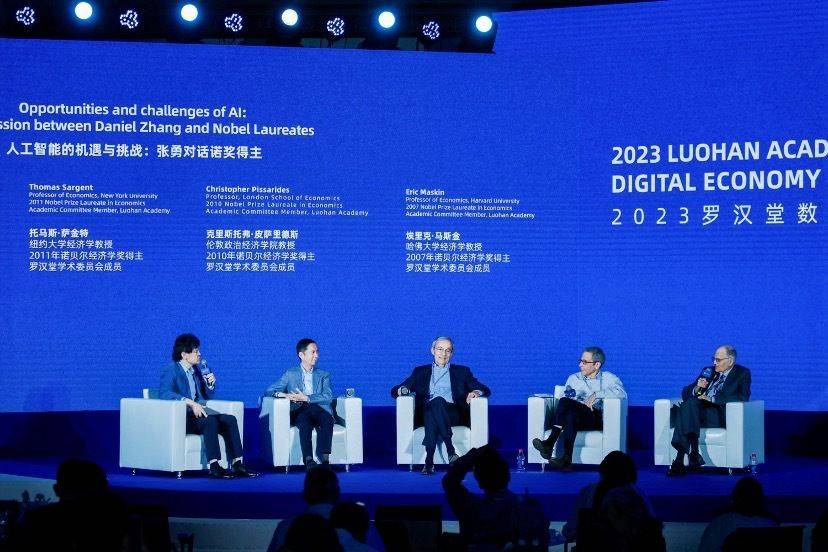
Based on reports from June 20 to 21, 2021, the 2023 Alibaba Luohan Hall Digital Economy Annual Conference has been successfully held in Hangzhou. The theme of this year’s conference is “Searching for the future as it happens.” Seven Nobel Prize winners in economics, pioneers and leaders in cutting-edge disciplines around the world, and representatives from the business community gathered at the West Lake to talk about global development issues such as artificial intelligence, sustainable development and climate resilience, and complex scientific development.
At the opening ceremony, Zhang Yong, chairman and CEO of Alibaba Group and Alibaba Cloud Intelligence Group, welcomed the guests on behalf of Alibaba, and started a conversation with a number of Nobel Prize winners on "Opportunities and Challenges of Artificial Intelligence". comminicate.

On the same day, Zhang Yong issued an all-member letter announcing that he will serve as chairman and CEO of Alibaba Cloud Intelligence Group full-time from September 10, focusing on the future development of Alibaba Cloud and continuing to enhance Alibaba Cloud's industry competitiveness and global competition. force.
Zhang Yong talks to Nobel Laureate in Economics Artificial Intelligence will be everywhere
In the "Opportunities and Challenges of Artificial Intelligence" session, Zhang Yong talked with three Nobel Prize winners.
Zhang Yong believes that artificial intelligence will bring new development to the entire society, and generative artificial intelligence will also bring new growth opportunities to all walks of life, and even create some new jobs and industries that are completely unimaginable now. Even the most creative people can hardly imagine the situation that the mobile Internet has developed so far.
Eric S. Maskin, winner of the 2007 Nobel Prize in Economics, believes that a new industry of "artificial intelligence consulting companies" will be born in the future for those who are unable to develop their own research and need to use artificial intelligence. Technology companies provide services.
According to 2010 Nobel Prize winner Christopher A. Pissarides, artificial intelligence is profoundly changing the way companies operate and the working patterns of employees, so it is very important to provide timely training to employees.
Thomas J. Sargent, the 2011 Nobel Prize winner who has experienced DingTalk, believes that digital tools such as DingTalk will be the key for companies and employees to improve productivity in the era of artificial intelligence.
Regarding the future of artificial intelligence, Zhang Yong’s view is: “Artificial intelligence will be everywhere, but I believe that humans have more wisdom than machines and will definitely be able to find a model to live in harmony with artificial intelligence and machines. ”
Luohan Hall released "Ten Questions for the Future", asking about the times with Nobel Prize winners
"Will artificial intelligence eliminate or create more jobs?" "Can the virtual world make humans happier?" "Will digital technology make the world more fragmented or more integrated?"... These are from this year's Luohan Hall United Global "Top 10 Questions for the Future" published by Top Brains.
"In the digital age, will the scale of enterprises become smaller or larger?" This is not only an economic proposition, but also a proposition about the future social form; "Does privacy protection hinder or promote the flow of data?" There are some counterintuitive but Thought-provoking... It can be said that these ten major issues are both realistic and future, academic and public.
In the view of Michael Spence, the 2001 Nobel Prize winner, human history has proven that technological progress will not reduce the number of jobs, but may shorten working hours. “This will be a very important long-term trends."
As for whether the virtual world can make people happier, 2016 Nobel Prize winner Bengt Holmström believes that this depends more on whether people can be more deeply connected to their communities, families and friends. , rather than for reasons such as money.
Thomas Sargent believes that a common "language" fosters connection.. Digital technology uses another global language besides Chinese and English. This globally shared language shares common values. If used properly, it will make the world more integrated.
Understanding Platform Responsibility in the Digital Age
This Luohan Tang Digital Economy Annual Conference also released two reports, "Understanding Platform Value and Responsibility: Principles and Practices" and "Data Economy: A New Stage of Digital Economy Development", which were jointly conducted by Luohan Tang and several Nobel Prize winners. co-authored by social scientists within.
The "Understanding Platform Value and Responsibility: Principles and Practices" report states that, unlike traditional corporate value creation methods, digital platforms build ecological communities, provide digital infrastructure and modular business capabilities, and promote communication among participants. Coordinate interactions and transactions to create tremendous social value. Digital platforms have different responsibilities than traditional businesses because of their unique approach to value creation. The report proposes four major principles: value principle, incentive principle, efficiency principle and fairness principle.
"Data Economy: A New Stage in the Development of Digital Economy" believes that the use of data should allow users to clarify their rights and understand the impact of data on themselves; at the same time, data users have the responsibility to provide reasonable rights for users. Solutions and effective implementation; promote hierarchical data management and clarify the rights of different data users; encourage the development and application of privacy-enhancing technologies such as encryption, anonymization, and privacy computing to promote the circulation of trusted data.
The above is the detailed content of Zhang Yong talks to multiple Nobel Prize winners: Artificial intelligence will be everywhere. For more information, please follow other related articles on the PHP Chinese website!




